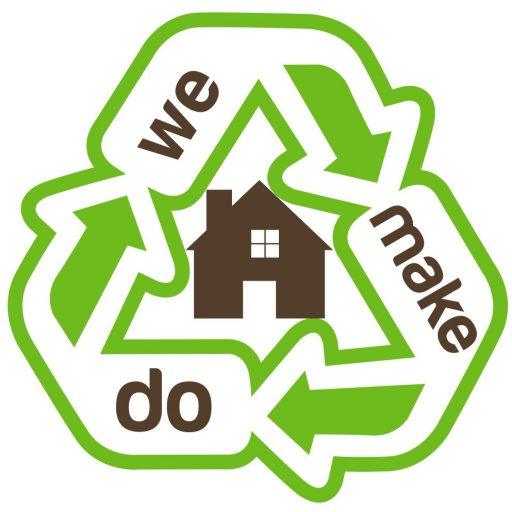
by wemakedo | Aug 12, 2016 | Uncategorized |
…but does that really mean buying brand new stuff?? Or does it mean saving money for more important things, and reducing the landfills that our kids will have to deal with when they grow up?
When we started this blog our intention was to share our ideas on reducing waste, while saving money. One of the things we hear regularly from other parents is how expensive it can /will be to rear children. There is no doubt it can be, but it for sure doesn’t need to be at least during their younger years (0-6 or 7 years).
We started the Baby Market in November 2011 (along with a colleague from a previous job) when our first child was 8 months old after finding that there was no place to buy quality second hand baby goods in Cork. We couldn’t understand why this didn’t exist here already: Ireland was experiencing a baby boom, the recession was in full force, and much of the baby stuff we buy or receive is hardly used by the time it is outgrown. To us, buying new things for our children felt obscenely unnecessary given the amount of these goods in circulation at any time. I didn’t want my new baby’s miraculous arrival into this world to be accompanied by heaps of plastic junk, bouncer chairs, buggies, changing tables, rattles and other unnecessary things that only get in the way of enjoying your new baby, and end up cluttering your house and your life. Give me a sling for carrying her and a few comfortable shirts that I could breastfeed in, and that’s all I wanted.
But after a few months, we did want a few things. A cot would be nice, and maybe I did need a buggy. A second car seat for the other car, some toys, books, clothes other than babygrows and maybe a bouncer after all. We were lucky enough to get many of these things second hand from family. But what did other people do? And what would we do when we were done with these things? They took up a lot of room. And they were still in perfect condition, even after 2 or 3 owners.
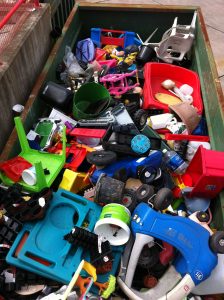
Around this time, I was at our local recycling centre and I took this picture of a skip completely filled with baby and children’s goods. The staff there mentioned that this was a typical week’s worth of hard plastic recyclables. I couldn’t believe my eyes! How utterly wasteful for these large plastic objects, many of which appeared perfectly usable, to be dumped! And when I inquired as to where the hard plastic recyclable waste stream was going, I was unable to get a direct answer…a question for another day.
New parents are so vulnerable to marketing. Marketers will reprimand you for not considering the absolute best or safest products for our children. This leads us to purchase way more than we need, perhaps spending more than one can afford at a time budgets are being stretched by a new family member. Well meaning friends and family come showering us with gifts, all of which are beautiful and thoughtful, but perhaps not entirely necessary…I know that for every new item that comes into my possession, another one or even two items are manufactured. When my first was born, I desperately didn’t want her arrival to mean another 100 kilograms of plastic consumption per year added to the environment. And the easiest way to try to battle this was to look for second hand items from day 1.
I felt it was URGENT and ESSENTIAL that an option to buy second hand should be available to all parents. And so The Baby Market was born.
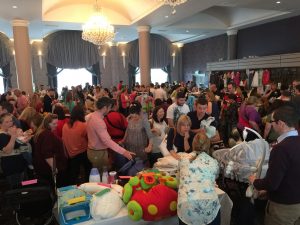
A recent busy Cork event
Shopping at the Baby Markets can save new parents hundreds of euros on the cost of baby and children’s goods while maintaining high quality standards. Parents that need to declutter can rent a stall and sell on their used children’s items, thus clearing out their house and making back money. The markets are financially beneficial for both buyers and sellers, while also tremendously benefiting the environment by providing an outlet for reusing good quality items rather than discarding them unnecessarily.
A third benefit from the markets has to do with empowering women, particularly stay at home mums, to start up their own businesses. The Baby Markets are run as franchises, with each event run by an organiser with ties to the local community. People contact us if interested in starting a new location and we provide materials and training, which along with their own skills and hard work will see them starting up a profitable business from the first event. This allows women who are highly skilled and choosing to stay at home with their kids, to maintain and increase their business skills while working from home. It also offers a venue for a thriving selection of small home based businesses to sell their wares alongside the second hand goods.
Baby Markets are every 6 weeks in Cork, and every 2 months is Dublin, Limerick, Tralee, Ballinasloe, Navan, and Carlow. See
www.babymarket.ie or our
Facebook page.
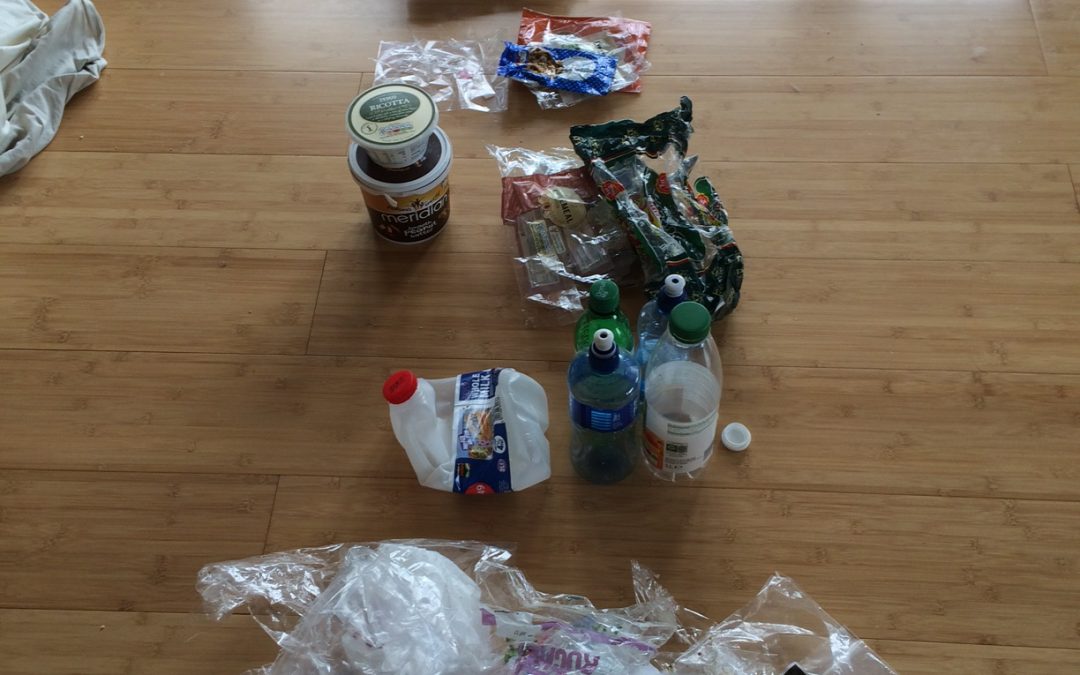
by wemakedo | Aug 7, 2016 | Uncategorized |
Plastic Free July ended, for us, with a whimper rather than a satisfying bang as the family headed off to the Southeast of Ireland for 10 days of camping. Suddenly all the changes we had made were overwhelming for us to keep up. Gone were the cloth nappies and washable wipes, cheese and snacks were again purchased in plastic and we found ourselves in possession of a few plastic bottles. However, while on our holidays, we continued to talk to people about our effort this month, which to us, feels nearly more productive than attempting to perfectly execute zero plastic consumption ourselves. Collecting collaborators in our effort is essential, and the process is futile without finding like minded people to join us.
To summarize our learnings, we found the greatest reduction in plastic use by going to cloth nappies (and potty training), using washable wipes, shopping at the local Farmer’s Markets using our own containers to buy produce and fish, shopping at Super Valu over other major chains for items we couldn’t find at the Farmer’s Market, and sourcing bulk beans, lentils and noodles at the English Market. This month also gave us the opportunity to try making some of our favourite snacks that came heavily packaged, such as yogurt, crackers, breadsticks and granola. Our biggest challenge was in finding dried fruit and nuts without lots of packaging (which we still haven’t done…)
So we made it to the end of plastic free July. Putting ourselves through this process has been a superb education about an issue that deserves some attention and that we can help with by changing some simple habits. We would certainly say that it was harder than we both expected…having had to forego many foods during July that we would just rather not live without, it will be nice to go back to those.
The thing is though that its hard to ignore the prevalence of plastic in our lives now that we have forced ourselves to pay attention. So thankfully our new perspective will mean that we plan to avoid a lot more that can be easily avoided, while continuing to look for sources of those things that eluded us during July. We’ve even considered whether or not there would yet be a strong enough demand in Ireland (yet) for unpackaged foods to justify bulk foods stores. Would such as business survive here yet? From our online searches, it seems that it won’t be long before these begin to appear in Ireland, as more and more people are becoming aware of waste issues and that in the case of plastics, recycling isn’t a solution.
Bring on Zero Waste Week in September! But until then, we’ll be discussing other things!
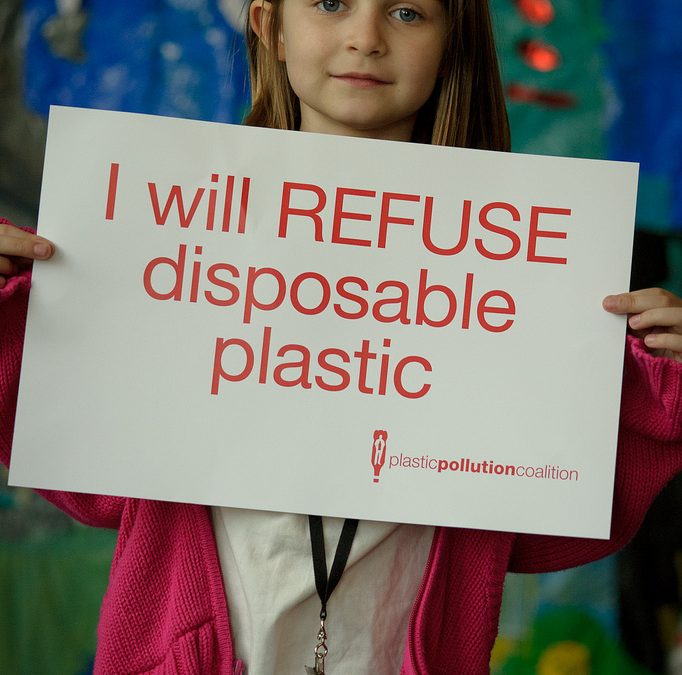
by wemakedo | Jul 24, 2016 | Uncategorized |
My wife and I looked at each other…hmmm…”we both looked thinner? Or fitter? Or something?”. It had to be as a result of our newly restricted diet in July, an unexpected result of avoiding any food wrapped in disposable plastic packaging. We had two friends over for dinner who we’d last seen only a month ago, and they were so certain we both looked thinner that they said it a few times during our evening dinner. They also knew about our July challenge as we had explained the frustrations involved and so we put it down to the distinct lack of snack-able junk in the house as it generally tends to be wrapped in plastic. Who’d have thought of this as a sideline benefit of trying to live plastic free?
We had noticed that later in the evening when the kids were asleep, that a final snack before bed was just a lot harder to put together, no crackers, a lot less bread (we were waiting for the weekly farmers markets to get our bread unwrapped and had been getting the quantities a little short), no biscuits or dessert type snacks either – no bedtime bowl of cereal unless we made more granola, and at this point there was just more pressing gaps in our diet.
To be honest it was a little frustrating, but probably quite a bit healthier for us. Mrs Makedo confessed to greedily stuffing down ”a lot of cake” when generously offered it at a friend’s house due to the recent deficit in her diet.
When at home with the kids, Mrs Makedo has regular callers for playdates. It was interesting to notice how different people responded to conversations about packaging waste. The older friends (say, over 50) thought it was just “going too far” and a little ridiculous. Yet in the same conversation, would fondly reminisce about a time when things just weren’t so packaged, i.e. paper around meat from the butcher, milk from the milkman, and cloth bags for all produce. Some friends might leave more plastic behind (after kindly bringing fruit and snacks) than our house had generated in two weeks. Other friends who had been aware of the pointlessness of excess packaging were spurred on to make changes themselves, and now meet Mrs MakeDo at the Farmer’s Market with their own coffee mugs and food containers in hand. From a quick poll of friends, we’d say there are definitely more people interested and supportive of this than not. But many still feel overwhelmed at how to start.
We had been thinking of trying to move towards “zero waste” – just in time for Zero waste week in September. But at the same time this is turning out to be tougher than we expected and so some of us at least are looking forward to a break in August before we regroup again. But for sure some of these habits will never leave us now. The thought of buying a plastic bottle to drink the water and then simply throwing it away has always seemed silly. Now having one’s broccoli or apples wrapped in plastic seems equally pointless, but with serious consequences that we as a family are much more aware of.
Please, please take a moment to follow this link to plastic-pollution.org and if you only scroll through the pictures to get a feel for the extent of the plastic waste problem then this excellent report from 2009 (updated this year) has done its job. Whether one decides to do anything about this particular issue is of course a personal decision (and there are countless causes looking for our attention these days), but do keep in mind that this is one cause that we the consumers have full control over and is a direct result of our purchasing choices. The manifestations of this waste problem are largely hidden for most people in the developed world where the majority of the waste is generated, while people living in other parts of the world see the disastrous consequences before them.
©© tedxgp2 / Plastic pollution coalition

 Around this time, I was at our local recycling centre and I took this picture of a skip completely filled with baby and children’s goods. The staff there mentioned that this was a typical week’s worth of hard plastic recyclables. I couldn’t believe my eyes! How utterly wasteful for these large plastic objects, many of which appeared perfectly usable, to be dumped! And when I inquired as to where the hard plastic recyclable waste stream was going, I was unable to get a direct answer…a question for another day.
Around this time, I was at our local recycling centre and I took this picture of a skip completely filled with baby and children’s goods. The staff there mentioned that this was a typical week’s worth of hard plastic recyclables. I couldn’t believe my eyes! How utterly wasteful for these large plastic objects, many of which appeared perfectly usable, to be dumped! And when I inquired as to where the hard plastic recyclable waste stream was going, I was unable to get a direct answer…a question for another day.